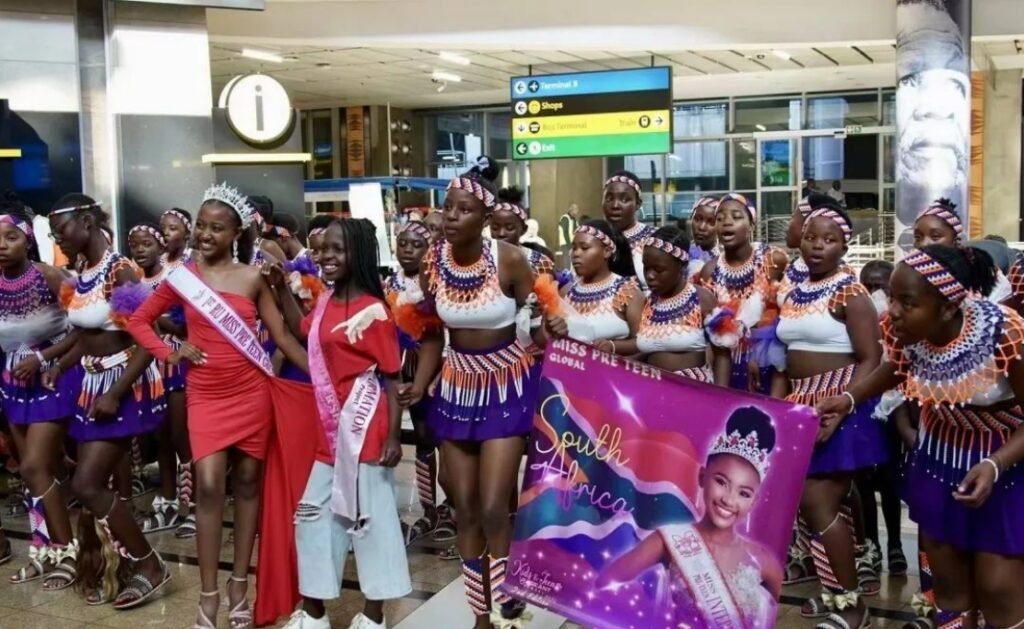Mpume might not be photogenic, but she’s tall and beautiful. She’s a Zulu, South Africa’s largest ethnic group, and the first in her family to go to college. In the ’90s, Mandela’s ANC took over the South African government, ending apartheid and giving free public education to all Black South Africans, including the Zulu and Xhosa tribes among the nine major groups. Mpume is our guide for the Zulu cultural experience on this trip. She grew up in Khula village in KwaZulu-Natal, the main province for the Zulu people. Unlike the typically commercialized cultural villages, Mpume will take us to her childhood home to show us around.

We quickly struck up a conversation in the car. Mpume told us that the Zulu practice polygamy, where a man can have up to four wives. For each wife, the groom’s dowry is 11 cows—cows are considered a more valuable “currency” than cash in South Africa. But Mpume said she and her husband are monogamous and legally registered. Once registered, a man can’t have more than two wives. As an educated woman, Mpume isn’t willing to share her husband with anyone else.
Seeing the high rate of teenage pregnancies locally, Mpume and her husband started a travel agency focused on Zulu cultural experiences. They recruit and train these young moms to dance and host tourists. Mpume also encourages them to get further education, believing that “only education can free women from men’s control and help them become their own masters.”
Our Zulu cultural experience tour was centered around Mpume’s childhood village: we started by visiting her family’s thatched-roof house to learn about local family culture; then we went to a nearby kindergarten to interact with South African kids—Black children here are like little iron eggs with big, innocent eyes, and when they run up to hug you, they’re so adorable they almost melt your heart. Next, Mpume took us to meet a traditional healer to explain the role of someone who handles village divination and basic medical diagnosis, detailing the process from calling to certification. Finally, we went to the plot Mpume and her husband bought, where, in a breezy green courtyard, we danced Zulu dances with young, unmarried moms and had an outdoor meal.

Zulu dance is truly a unique, primitive form of dance—it’s a vibrant and powerful display of femininity, with moves that are sometimes intense and sometimes wild. The smiles of Zulu girls, set against their black skin, are so heartwarming. In the bright green courtyard bathed in sunlight, surrounded by their singing, drumming, whistling, and laughter, I couldn’t help but join in and dance along with them. It reminded me of a grand welcome ceremony I saw a few days ago when I landed. It was a school’s celebration for South African beauty queens under 13 returning with honors. They put on a lively performance with drumming, singing, and dancing for over an hour in the bustling airport—it was impressive how energetic those girls were!

Mandela is from the Xhosa people, South Africa’s second-largest ethnic group, with around 8 million people. “As I walked out of the prison cell toward the freedom of the prison gate, I knew very well that if I did not leave my pain and bitterness behind, I would still be in prison.” This is one of his most admired quotes. After 27 years of imprisonment, Mandela came to see his country and people’s fate in a new light. He chose forgiveness over revenge, bringing peace to South Africa’s colorful land and a lasting inner freedom. When we arrived in the picturesque Western Cape, searching for the legendary “luxury camp” of our trip, we had no idea what extraordinary experiences awaited us.
The Xhosa people are organized as a patrilineal society, with each clan consisting of multiple groups, each led by a chief. A chief’s status within the clan is determined by lineage. Clan affairs are managed and governed by a council made up of leaders from smaller clans and family groups. However, Xhosa women are traditionally excluded from political participation. In Xhosa society, land is communal and allocated according to need, and goods are shared among the people. A strong emphasis is placed on preserving traditions inherited from ancestors.
Each individual within Xhosa culture holds a specific social role from birth. Throughout their life, a Xhosa person undergoes various social rituals, each marking a significant stage of personal growth and helping them define their role in the community. These ceremonies are designed not only to introduce individuals to their peers but also to establish a connection with their ancestors.
One of the significant aspects of Xhosa culture is its funeral tradition, where attendance is open to all, without the need for an invitation. This means the bereaved family must prepare to accommodate an unknown number of mourners. Traditionally, the family serves inkobe (boiled dried corn with water) to mourners, with the corn coming from the family’s own reserves or donated by relatives and neighbors. However, in modern times, serving inkobe has become a social taboo, seen as shameful.
On the day of the burial, Xhosa women prepare food for the extended family. Before the family gathers, they perform the ukuxukuxa (cleansing) ritual, which typically involves slaughtering a goat, sheep, or other domestic animal. The day after the burial, another cleansing ritual is held, where the women of the family go to the nearest river to wash the clothes and blankets used by the deceased. Any remaining clothing in the home is cleared out, and family members shave their heads—a symbolic gesture to show that life continues even after death.
Xhosa traditional beliefs, like those of other South Bantu communities, consist of four key elements: belief in a god, reverence for ancestors, trust in healing practices, and fear of witchcraft. While Xhosa people worship ancestral spirits, they also believe in a Creator who cares for and protects them in times of crisis. Ancestors are thought to watch over their descendants, ensuring the success of their crops and livestock, and they often communicate through dreams. Since not everyone can interpret these dreams, diviners—who serve as intermediaries between ancestors and the living—play an essential role. These diviners are easily recognizable by their distinctive attire, usually featuring white garments symbolizing purity.




